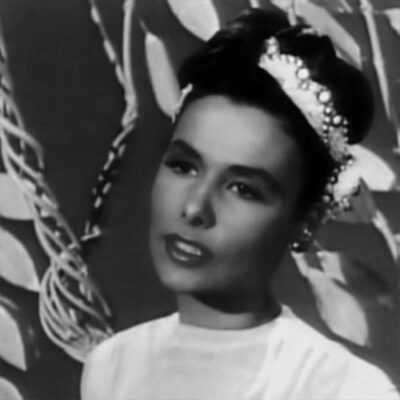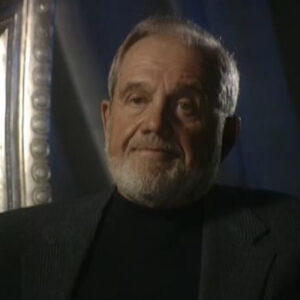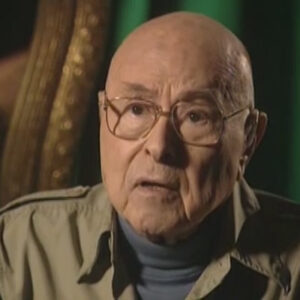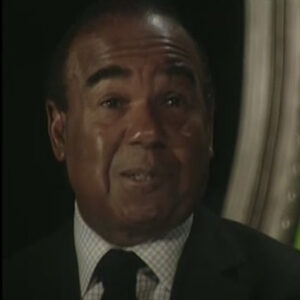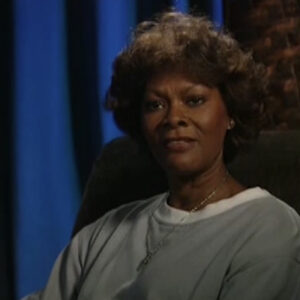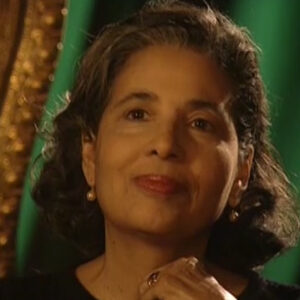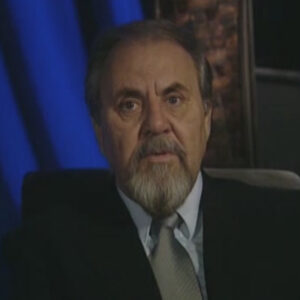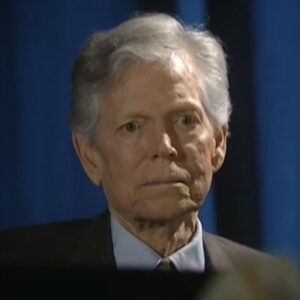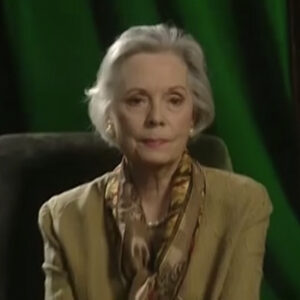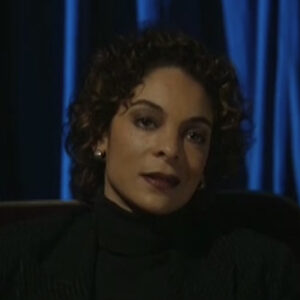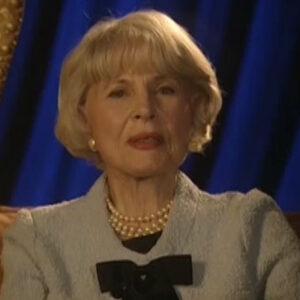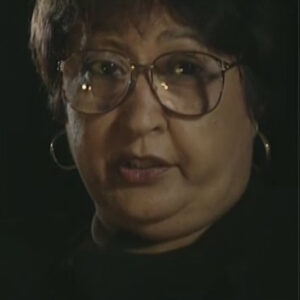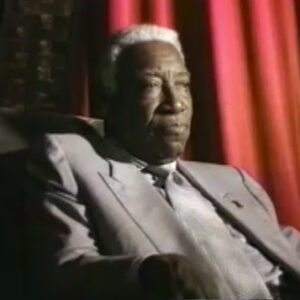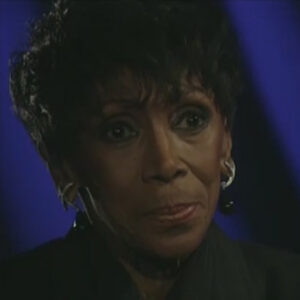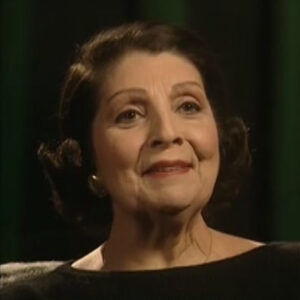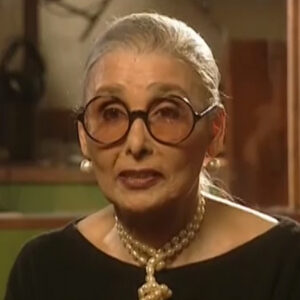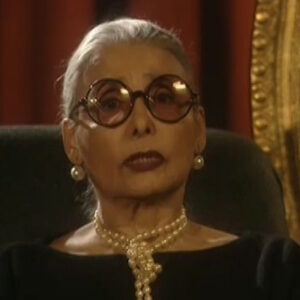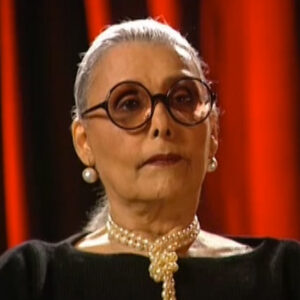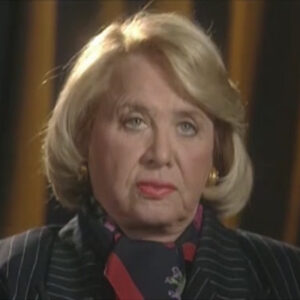Speaker I first met Lina in Paris in the early 50s. I was over there working for the publishing company and she and Lenny and Gayle and I think Terry came over for most of the summer and we had a lot of mutual friends. But Paris, as it usually does, closes down for the summer. And I was about the only one left in town they knew. And so we saw quite a bit of each other. We used to get together in my apartment on Sundays and there was an old ice cream freezer there. And we make fresh peach ice cream because the kids seem to love to turn the thing we used to have sort of musicales there. Occasionally I had a piano and I remember once Bertelsen was passing through no bird with a friend and ally, but he had the puppies with him and we had one marvelous afternoon of Kukla, Linda and Ali, which is really something to see, which we taped. At any rate, we saw a lot of each other. And at one stage she was going to do a gig in the south of France. And I went and I spent a week with him in Monte Carlo. At the time, I went up to Austin in Belgium to see her show, and in Paris she appeared at the money that the Moulin Rouge is where it was, but also in Monte Carlo, James Bond and a lot of wonderful.
Speaker Based on performance, you think it might because you happened to witness?
Speaker I’m not sure it was the same one she she used to appear at the sporting club. I think every year when I went down, she’d already done that particular evening and she was doing another one in each one of the which is when I saw.
Speaker What was special about the. Well, in first place, as long as beautiful women in the world, second place is just electric, you just her mannerisms, just everything about her just makes it such excitement. In Paris.
Speaker Leaders seem to be most comfortable in Paris.
Speaker Well, I think it had to do with the fact that that’s where she and Lenny were married and they had a friend there who made the arrangements. And and that’s where it happened, I think, in the. In the mayor’s office in the 16th arrondissement, it’s very cold. I wasn’t there at the time. This was many years before.
Speaker Which you always love, Paris, so reality.
Speaker When you were together and did you ever like, for instance, meet after her show, or what would you do after hours?
Speaker Um, usually go out and have dinner somewhere. A few drinks and entertainers always have to unwind, they give you they can’t eat beforehand, so it’s a matter of loosening down. It’s sort of hard for a nine to five year to socialize with entertainers because it’s a little difficult the way of the hours concerned. But we managed to have a good time.
Speaker Right, dear. I just need you to use his name.
Speaker I mean, oh, Lenny, I’m such that Lena Lennie Hayton was one of the dearest people ever. He was. He was funny, he was certainly a great, great musician. No question about that. In fact, to sit in a room and hear him work on arrangements was to a novice was really inspirational.
Speaker I mean, he certainly handled Lena’s career beautifully in her nightclub era, but I think it got very tiring after a while.
Speaker He’s constantly on the road. When you say you handled your career well, I think I think he’s the one that more or less.
Speaker Excuse me. Well, they admitted MGM and I think that he is the one that sort of developed her into the marvelous nightclub act. She was I think other people had a hand in it, but he’s he’s the one that did her arrangements primarily.
Speaker And he was, like I said, the master musician was also in her life or back in person, a real fashion plate.
Speaker Yes, indeed. She had a lot of good designers. I used to hang around Brooke’s costume when she would be fitting out for a nightclub acts. Bobby McIntosh was doing most of the costumes then. And it she she had a great eye for colors and. Style, and I remember going shopping with her once she had to find some white satin shoes in great quantities, that she could die to match various of the dress that she was getting when you when you went to work with Bobby Mackintosh.
Speaker What kinds of what kinds of costumes really set?
Speaker Well, he was just making these beautiful formfitting gowns that she wore for a nightclub act that looked like they almost voted on her. In fact, before she went on stage, I remember the old days her housekeeper, Irene, used to soar into the dresses and she’d go back on stage with what we call her Chinese walk, which is just one foot after another steps.
Speaker Thank you for that. I’m glad you asked that question, because I follow the truck, we go to the Chinese wall.
Speaker What’s the Waldorf era? Was they? She was redesigned for four weeks. And it was such a huge success that they extended it for another four weeks and early in the game or RCA wanted to record and they set aside three nights to do it. And the first session was so successful, that was it. They did it.
Speaker And the one one evening. But.
Speaker I think during that, the run of the shows, everybody famous in the world would come to see her and usually come upstairs to her hotel suite afterwards, and it was quite, quite a period. Well, I remember the nights that I didn’t happen to be there. We go to Joan Crawford night. I miss that. I miss the second night. I miss the garden the night, but.
Speaker Goodness. Anybody you can name, no. Is it true that you grew up?
Speaker We were from the same area in the South? Yes. We didn’t really grew up together. I met her when we were both seniors in high school, and she came to a couple of college dances in our youth.
Speaker OK, well, I would love for you to tell me, is that new neighbor going to the same place?
Speaker No, we didn’t go to the same high school. No, I was I was from a town called Smithfield in North Carolina, and she was in a small community nearby. And I met Eva during summer vacation and. We were in the same boarding house, as a matter of fact, and.
Speaker It was a very dear friend of mine, yes, indeed, in fact, there’s an Ava Gardner museum in Smithfield and. Leena’s, I think she gave you permission to be on the board of directors, not that she does much about it, but she’s she’s on the board and she was very, very fond of Eva. What was it? Well, no, no, I never saw them together. Frankly, I didn’t see much of where she went to Hollywood. We kept in touch, sort of, but.
Speaker Well, the movie at MGM, for one thing, and. Lina had worked with already Shole and Ava was considering becoming a musician.
Speaker And I think she asked Lena for some advice on that score. And I remember hearing about one party where they sat under the piano and sort of nodded away because just to get out of the crowd and Gail has marvelous stories about Ava coming by. She evidently lived down the road from where Lina was living then in Hollywood of whatever the suburb was, and they would stop of you in the white Cadillac convertible, driving barefoot and stopping and have a drink on our way home after the studio.
Speaker Oh, could you tell me about that?
Speaker I’m getting her.
Speaker Yes, when Leonard decided to put roots down in New York after being in hotels, most of the time they had a hard time finding an apartment because of the whole racial situation. And Leonard didn’t want to get it under subterfuge, which he would always send a black emissary to check out the apartment before she even considered it and was getting nowhere. In fact, she even tried to get into the father when the father Divine’s building up on Central Park West and wasn’t allowed there. And it was just it was ridiculous and disgraceful. But at one stage, she met Andre Casablanca’s, who was a famous orchestra conductor at a party, I think, and he had asked her to do a gig with him in Rochester, New York, one summer. And she said she couldn’t because she just had too much on her mind trying to find a place to live. He said, do the gig and I’ll get you an apartment. She did. And he did. And that’s when she settled into West End Avenue about, what, 64 Street, I think.
Speaker I understand there was some fabulous party that there sure will. They were decorating the place beautifully. We did a lot of shopping for Chinese and Persian rugs and also all kinds of Uji d’Art and our own bedroom had red flat wallpaper, which is it was quite, quite an apartment. But any rate, the one I remember best was one that she gave a Noel Coward.
Speaker And I was just saying, all right, yeah, OK.
Speaker The party on West End Avenue that I remember best was the one that she gave an awkward of. I particularly remember this because I was over there in the afternoon and Lena was cooking a stew or something and I was sitting on a stool and it was quite a good fit. By the way, I don’t think she does much of it now. But anyway, the telephone rang and somebody asked if he or she might bring Marlene Dietrich to the dinner, and Lina said no. And I said, OK, why not? Why not? Because I’d love to have amnesty. And she I don’t want her hanging over me while I’m cooking. At any rate, it was quite an evening. And I remember Rock Hudson being there. And also in in one of the other rooms, there was sort of a so-called children’s party Gail had some of her friends in. And I was particularly sorry about Jean Seberg, who was almost a movie star. You know, she said that fiasco with Joan of Arc, but moved to Paris and she was there as one of the children, which was pubescence like with her nose pressed to the glass where all the adults were in another room living it up. That stayed in my mind after Jean went on to even sadder things.
Speaker So would you mind?
Speaker One moment to tell you about the story and when you do it, could you sort of sound a little bit the way we would sound?
Speaker I don’t know that. I didn’t know it was kookiness do or something for a dinner party for Noel Coward. And I was sitting on the kitchen stool, even a company, and somebody called to see if Marlene Dietrich might come to the party. And Lena said, no, no. And later I said, OK, why didn’t you let her come? And she said, I didn’t want her hanging out with me while I was cooking.
Speaker Jamaica, yes. Well, Jamaica, I went down to see one of the performances in Philadelphia, and it was just so bad, I just ready to go back afterwards to have supper with her.
Speaker And then I was just I don’t know what to say.
Speaker It was flat. No fun.
Speaker And then I went to the opening night in New York, and it is like Lee and I had said, the hell with everything they’ve told me to do, I’m going to go out there and knock them dead. And did she ever. It was a completely different show from the way she was doing it. And it turned out to be a big hit. But that was a revelation the way I see it, on one hand and then the other hand, showing just what she could do when she set our mind to it. What was difficult in terms of her performance, I just think she was listening to too much of Bobby Lewis’s directions.
Speaker That she just. I think she was subdued.
Speaker And the opening night of all the juices started to work and she said, I’m going to be me and you just burst forth and it was marvelous.
Speaker Now, how would you characterize. In the nightclubs, I mean, what kind of personality did you see there?
Speaker A certain hot-air, I think, is a good word for it.
Speaker Say, oh, I’m sorry, lainer in nightclubs, I guess there was a certain hotel which I think was part of her charm. She was just not going to take any nonsense from anybody. And she certainly sang well and she had great numbers and great arrangements.
Speaker And she just would have an audience in the palm of your hand. And I never saw her let down an audience ever.
Speaker How does the lemur that you saw in the nightclubs differ from the llena in the late.
Speaker Well, she’s she had become angry by lady and her music llena have become angry about the title of Lettieri music, and she she had she also had a cold in the nightclubs. I think she was aiming to please, but literally music. She was just very baring her soul. And that’s what made it such a marvelous, marvelous show.
Speaker You have as you get older, I think the.
Speaker That’s my glasses and my stop. Yeah, sorry. Can I interpolate a story here to my mind, at one stage, Lena was to go to Rio to perform at the Copacabana and we had a Brazilian friend who’s gathered around and found a lot of Brazilian records that she might she would always like to do one song and in the language of the country and in a few polite sayings like, thank you, ladies and gentlemen, it’s a pleasure to be here. Things like that. And he was going to coax her in the Portuguese and also to find records. And she picked out one record she liked and she learned it. And when she opened at the Copa.
Speaker After the show, a gentleman appeared at the stage door and it was Jobim, she had picked one of his songs.
Speaker This is what a great ear they had. And it was a Balzano. And Jobim gave Lili an option on his music for the United States. And of course, nothing ever came of it. And six months later, Stan Kenton came out. It doesn’t matter whatever the name of it is, and bossa nova took off. And from then on, you know, didn’t want to hear your baby’s name. She was sorry about all of that because they could have made a big deal out of his music.
Speaker You were telling me that the of. What did you tell me about what it’s like to be Lena’s friend?
Speaker Well, she was she was always very generous, not only when you go out with them was never a check, but it just over the years, she just I don’t know. I got great things from I got a silk Chinese dressing gown from her once I got a marvelous set of dinner plates. I got an enormous coffee pot once. They used to she used to want a very family Christmas, they had always had an enormous tree up on West End with it.
Speaker Evidently, she had a lot of old decorations in storage and she’d bring them out and there’d be a very elaborate tree dressing, just her and linen, the children and always a beautiful tree.
Speaker At one stage, she and Lenny had been given one of the early, early color television sets by RCA and they were going to Europe and they let me keep it for the summer. And boy, was I popular because nobody else we knew had won because the set was about the size of a piano on the screen, about the size of a bathroom mirror. But it was it was it was quite something to have their.
Speaker Um, you had mentioned that, um. She mentioned something about hitting the.
Speaker While he was going to use his name, um, Teddy well, Teddy was going to Stanford, did you go to Stanford? You see, I think of Berkeley while he was in school in Berkeley, he was attacked. He was dating a white girl and he was attacking rather badly injured. And I always thought that the result of this occasion hastened his death because I think he died of kidney complications years later. And I think the beating might have had some effect on that.
Speaker But he certainly did not help Lina, but she knew she was very, very upset by this Natalie.
Speaker Oh, were you around her when she went through that horrible period of losing her, I.
Speaker No, she was already living back in California by then and.
Speaker I didn’t have much contact with in those days, but when I when I read about Lenio because I wrote a note and when I read about Terri, I wrote a note and it wasn’t already in the music. And she was back in New York for any period of time that we’ve got to be friendly again.
Speaker Or close, I should say, always friendly, but close. Oh.
Speaker When you first got to know, was there anything about her that surprised you that you didn’t expect from this performance?
Speaker Well, I never seen her on stage until after I got to know her. That’s the thing, because we were running around in pairs like a family long before Bill. It was just before I ever saw perform. I’d seen her in movies, of course, but that doesn’t count because you just don’t think of a good friend as.
Speaker It is the same person when you were you you were born in the South. A lot of her scenes were cut of.
Speaker In the South, as you experience, mean, not to my knowledge, I remember and what you see, I.
Speaker I went away to college at the age of 16. This would have been in 1938 and it was before a movie started, before a movie career began, and certainly in a college town, they weren’t going to cut out anything like that. It just didn’t make any sense.
Speaker And by the time she was really doing more and more movies, I was probably in the Navy by then and we were getting everything intact. When I got out of North Carolina and about 42, do you remember seeing a movie with the Navy?
Speaker Like maybe like I saw it somewhere, I can’t remember where.
Speaker And also, what was the other one saying this is no stormy weather, right, sorry about that.
Speaker You mentioned something about the cheating.
Speaker Yes. What’s it called the.
Speaker Years ago, the Learning Center is the publisher magazine, and they have them for free and these all these little stands on street corners, but they have a series of lectures over the park Sheraton Hotel. And she did one. And it was it was just marvelous. I joined the club just to get there that evening. And it’s just too bad you can have that on tape or something, because she really she gave her whole feeling about performing. And I can’t articulate like she did, but it was just how she would could react to an audience and what have you. And she’ll have to tell you all that because she put it very well.
Speaker Oh, poor dogs. They did, yes, they were.
Speaker I’m not I’m not much of a pet person. One was a a shiksa and one was a poodle, I believe not not a poodle is Chinese dog Pekinese. Named Lila and Ruby. I know she was quite upset when she lost them, but I don’t remember being around at that time. I have a great picture of her with and the two dogs, however.
Speaker Yeah, you do. OK.
Speaker Leave a big gap in my world, but you may have it all for sure. And is there anything else that you can think of the. Even before she became so actively, completely, actively in the race situation, she was still being very I mean, she she she was.
Speaker Making headway.
Speaker You know, her one of her grandmothers was the founder of the NAACP, was it not? It was the Urban League in Brooklyn. Yeah, but anyway, so she was always sympathetic to whatever they had to say. And I remember when she once or twice when she was sailing for Europe, who delegations would come down to see her all from various organizations. And I remember once I was up at the apartment and was very impressed, me, Daisy Bates, who you remember who she was. She was the one that instigated the Little Rock school desegregation and she was in town and she came to visit Lena Dunham, quite a charming woman, very impressive meeting to tell you that about the prisoner of war situation that she called for Daisy Bates.
Speaker You know, she was performing for this audience know, and they have the white prisoners of war seated in front of the blacks.
Speaker No, I didn’t know anything about this story. But she knew Daisy before then. Mm.
Speaker I don’t have anything else to ask you. Well, let me just ask you to characterize together, Lena seemed very dependent on him in first place.
Speaker He would. I’m sorry. Lina seemed very dependent on him because he did everything for he shielded her from whatever. He would always take the phone calls. He would have the cars. He would. They were they were very fine, she called him daddy. Now, I don’t know it if I can make anything of that or not, but they were.
Speaker A. I don’t know what else to say here.
Speaker Had you ever met me, never, I never did know.
Speaker I met a lot of her uncles from both sides of the family. She had several uncles. One was a famous lawyer in Washington, I believe Nat Horn, that was his name. I met her mother and her stepfather. I never really got a fix on her, she was she was sort of in and out and she seemed to I always had a feeling she was a hanger on primarily. But you can’t blame her for that.
Speaker She’s had a frustrating career to understand herself and was maybe a little resentful of it. But she did a good job somehow because it turned out to be a woman.
Speaker OK, so I have to ask, you have nothing else.
Speaker I don’t I think I’ve I think I’ve said enough. Thank you. Right now, how do I get that picture to you?
Speaker We will.
Speaker The apartment on West End was really a marvelous apartment, the the two front rooms were of one was a living room was the dining room. The living room had, of course, the grand piano. And a lot of Chinese associate art and the dining room also had a lot of Chinese street art. Linda shopped around for all sorts of porcelain and oriental rugs and there was a big kitchen. And then and then bedrooms all over the place, I don’t know quite how big the apartment was, but it was it was it was spacious and still cozy. And as I’ve said before, a great party apartment.
Speaker What do you think about Linda’s bedroom? I think she called it a whorehouse decor. It had red light wallpaper, among other things. And I can’t remember whether it had a canopy or not. But it was it was a sort of I think it was a black mahogany bedstead and.
Speaker Of that’s about all I can think. I don’t have total recall information getting along.
Speaker A lot of pictures of family or, you know, I don’t remember that.
Speaker Do you feel that the Glena harbor a lot of resentment for the racism she experienced in the.
Speaker I don’t I can’t answer that. I don’t know, it is sort of a subject that we’ve never even gotten close to and it’s I don’t know that you have that much to discuss it with or other people close to her.
Speaker I just there’s just nothing I know that she can to keep things in.
Speaker I think she probably does. Yes. I’m at Lena’s mother and stepfather, mainly on social occasions at the apartment and backstage, and I found her.
Speaker I think a rather. Selfish and. Disappointed woman, I think she she wanted to be a star herself and didn’t make it, and she may have felt a little resentment, but also she didn’t mind accepting Lena’s support in the way of.
Speaker Taking care of her properly.
Speaker And like I said, this may be unfair to the woman, but because she must have done something right, because it turned out the way she did is a marvelous woman.

